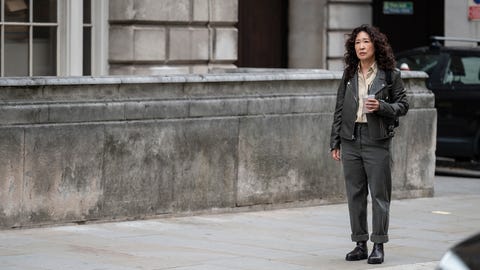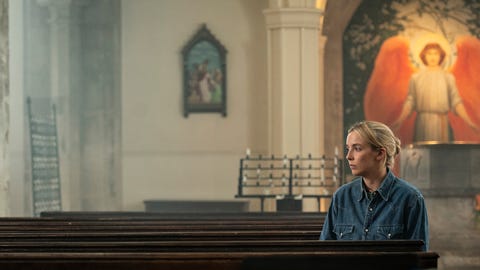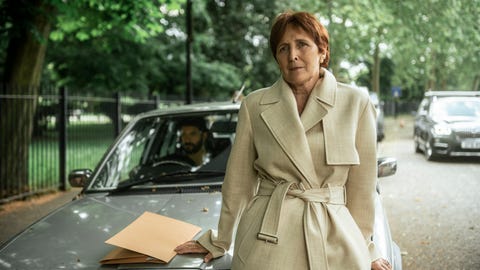On a gray day last October, production on the fourth season of Killing Eve was coming to an end, with just one week left of filming its final scenes. At a
pub in the London neighborhood of Pimlico, the show’s three protagonists—Villanelle (Jodie Comer), Eve (Sandra Oh), and Carolyn (Fiona Shaw)—were filming a pivotal conversation together (no spoilers!). Watching them in action, it was hard not to be struck by how much Killing Eve has changed the landscape of television for female characters. As Comer, Oh, Shaw, and new cast member Anjana Vasan played with different takes on this tension-filled sequence, it was evident that we may never have a show quite like this again.
For the producers and the actors, who have been deeply involved in their characters’ storylines, the fourth season felt like the right place to conclude the show’s journey of dogged M16 agent Eve, stylish assassin Villanelle, and their cat-and-mouse obsession with each other. It might have continued to five, according to Shaw, had it not been for the pandemic delaying things after season 3 wrapped, but everyone involved agrees that this is the right moment to say farewell to Killing Eve.
“There’s something about the format and the complexity of their relationship that is hard to sustain,” explains Comer, speaking later via phone. “Me and Sandra definitely spend a lot more time together this season than we have previously and it feels like we’ve earned that. It feels like it’s naturally come to that point. The big question has always been: Can they be together? It seems impossible. So it felt like it came to that natural point. You never want people to get tired of things. The show is always about this amazing element of surprise. We really wanted to uphold that.”
“When you are able to know that you have a finale you’re just able to craft something with a different approach,” Oh adds. “You know where you’re going—kind of. This one felt right to finish at season four because it felt really right for the characters.”
The last eight episodes, however, are not simply about what happens the finale. There’s much drama still to come, as Shaw points out. “It’s a nice series in that its end is not the sum of its parts,” the actress says. “There are many adventures over the next few weeks that people can enjoy. So I don’t need to give spoilers about endings because, actually, it doesn’t really matter. There are lots of things that will happen.”
Searching for the Right End
Although season 3 aired in 2020 during lockdown, the episodes were obviously filmed pre-pandemic. Killing Eve, which previously has released a new season every year, went on pause. Although head writer Laura Neal and her team had started penning season 4, they’d only had a physical writers room for two weeks before everything shut down. It was unclear when filming would be able to happen, which meant the writers ended up with double the usual amount of time to figure out how the series would end.
“In some ways it’s been amazing to have the extra time,” says Neal, who follows season 3’s head writer Suzanne Heathcote and season 2’s Emerald Fennell. “And knowing this is the final season, [we’re] really interrogating our decisions. We haven’t been sitting around twiddling our thumbs—we’ve used every moment of the extra time.”
She adds, of getting the ending correct: “It was hard. We’ve had lots of discussions. We’ve discussed every conceivable end point for these different characters over and over again, trying to find the one that feels right. It’s taken us the best part of two years to get to the place we are now, where everyone feels really excited and we feel like we’ve got the right ending for the characters.”
“The end of the series was really about making sure these three women were in control of their destiny.”
Oh was also grateful for that extra time, as disruptive as it was. She notes that it means the ultimate ending of the show has evolved, potentially for the better.
“There was an ending and then the pandemic happened and then that ending changed and then we pivoted,” the actress says. “And then as we were making it, the ending changed again. That’s just what happens when you’re in the process of making television. When we finally came to the real, real, real ending that was very much an immediate, collaborative process.”
There were a few key elements involved with scripting season 4, which opens with an undetermined time jump from season 3. One was that Eve, Villanelle, and Carolyn all needed an opportunity to carry their stories forward.
“I like to talk about the three of them, the three women, because it’s always been really important to us that this show is really about Eve, Villanelle, and Carolyn,” explains executive producer Gina Mingacci. “The end of the series was really about making sure these three women were in control of their destiny.”
It was also essential for Neal and the other writers that season 4 didn’t repeat what has come before while staying authentic to the characters.
“It was a challenge: How do we do something new, but also keep the essence of the show the same?” Neal says. “We knew we wanted to end it in a big way and also be completely true to all the characters. It was a case of inside out—where do we want to see these characters end up? What journey do we want to take them on? And then how can we do that in the most satisfying, glorious, memorable way?”

Filming During a Pandemic
Once Killing Eve was finally able to restart its production on season 4 in June 2021, the world had changed. The globe-trotting series suddenly was confined to less locations, which meant that most of the new season was filmed in the U.K. The characters still journey elsewhere, to Paris, Russia, and a more far-flung locale to revealed as the episodes unfold, but for the creators, it felt full-circle to bring the story back to the city where it began.
“A silver lining of COVID was we loved ending in London,” Mingacci says. “That’s exactly where the show should end. We embraced all the bits of the U.K. we haven’t been really able to explore in other seasons. And we tend not to show iconic locations. I mean, sometimes they have to be those places, but we’re not shooting the Eiffel Tower. We’re shooting the grubby bits too. We like it to feel real.”
Most of the crew on season four remained the same as past seasons, which was a huge benefit for the actors (“That makes a big difference because you already know who that person is behind the mask,” Oh says).
Like with previous season, Killing Eve’s final episodes were shot mostly in sequence. That means that the final scene was filmed on the last day of production.
“What was really surreal was the last shot we did was the last shot of Villanelle ever,” Comer says. “So that was weird because once I’d done that, it was done. There was something about finishing on that final shot of her that was actually perfect in a way. What was great was Sandra and I were together for the whole of that last week, so we got to experience that together with the crew. That was a really lovely experience to get to do all that together.”

Evolving the Characters
At the end of season 3, Villanelle and Eve meet on a bridge, with Eve admitting, “When I think of my future, I just see your face over and over again.” The episode concluded with the characters ultimately walking away from each other. While it’s unclear exactly how long it’s been since that moment, season 4 opens with Eve, Villanelle, and Carolyn all in completely new places in their lives.
“For me it was important to have the feeling of the passage of time,” Oh says. “To have the feeling that they’ve both spent time in other worlds and have been separated. The bridge at the end of season three was written as a romantic cliff-hanger, like what are they going to do? It’s classic storytelling. But I feel like it was important to shake up the beginning of the fourth season and put them in completely different places. They’re not where they were on the bridge.”
Villanelle, as seen in the trailer, is on a path to righteousness. She’s joined a church and wants to find salvation. The question at the heart of the first few episodes of season 4 is: Can a Villanelle change her spots?
“I think we’ve been questioning throughout the past seasons, ‘Can she change?’” Comer says. “Season 4 picks up with her actually trying to put into practice. What’s really interesting is that Eve has changed—I think she’s consciously done that from a truthful place—whereas I’m not sure who Villanelle is trying to prove this to. I don’t think she does either. And she thinks it’s going to be easy, but she’s definitely confronted with that dark side of herself that she can’t escape from. [She] doesn’t really know herself. She’s always morphed to what she needs to be and she’s been constantly been used as a pawn and she’s been able to use that an advantage, but I think she has a new awareness now of her place in all of that.”
Many fans will be rooting for Villanelle to return to her murderous ways—and Comer is with them. The actress wanted to ensure that the final season of Killing Eve allowed Villanelle to be her delightfully devilish self.
“It’s funny because we have been trying to unearth the humanity in her, but that was one request I had for Laura: ‘Listen, I’m all for doing this this, but let’s get her back,’” Comer laughs. “And Laura was like, ‘I know, I know. I’m with you.’ I wanted to see that kind of old spark back. But she has to go on a journey to maybe get back there.”
Eve, meanwhile, has embraced her badass self. She’s physically stronger, mentally fiercer, and even rides a motorcycle. The character hasn’t exactly succumbed to her own internal darkness, as some interpreted from the trailer, but instead has allowed Villanelle’s influence in. Ultimately, Oh wanted to “energize” Eve.
“There was quite a long time between the end of the third season and shooting the fourth season, and it really affected me,” Oh recalls. “I wanted to integrate time—that sense of time and the sense of change. I definitely wanted to energize Eve very much. We see her changed. We see her changed in some ways physically, we see her changed in what her job is, we see her changed in how she approaches looking for [secret assassin group] the Twelve and doing her job. That’s how I wanted to signal to the audience that we’re starting in a new place.”
Carolyn, too, has evolved, which Shaw found somewhat challenging to play. The character, having made a purposeful kill at the end of season three, is now on her own as she searches for the Twelve.
“She is no longer able to hold on to her job at MI6, so we meet her at the beginning of the series kicked out of MI6,” Shaw explains. “She, therefore, hasn’t got that wonderful, suave power that she’s been enjoying for the previous series. So she goes off on her own, maverick-like, without power. It was very odd to be in that position. It was odd to be playing Carolyn without a stream of people who do her every bidding. In a way, she goes back to what she must have been like 30 years earlier when she was doing the stuff.”

A Lasting Legacy
When Killing Eve’s first season, written by Phoebe Waller-Bridge, premiered in the spring of 2018, it felt like something we hadn’t seen before. Everyone was complicated, and the women did bad things just like men have always done onscreen. Villanelle, in particular, was hilariously compelling and the growing obsession between her and Eve was oddly real. Oh remembers feeling everything click during the early scene between Eve and Villanelle in the kitchen, noting that it was unusual to find a show with “the most heightened of circumstances with characters who are truly, authentically in their space and in their emotions and you can subvert it with humor and wit that is deeply true to the character.” She credits the #MeToo and Time’s Up movements happening around the same time as part of the reason viewers latched on to Killing Eve so aggressively.
“The universe is there to be solved by women just as much as by men.”
“When we launched everyone was really ready for it,” Oh says. “It makes me sad to use the word refreshing, but we were basically starving for these complex characters. And morally ambiguous characters. And delightful, delicious, genre stories that we can enjoy a certain amount of escapism with.”
“It was like a breath of fresh air,” Comer adds. “Like, what is this? No one really knew. Which I think is great—when you can’t put something in a box it means there’s something interesting there.”
Shaw sees that as the show’s true legacy. “You began to realize how regressive we’d been until this point,” the actress affirms. “Why shouldn’t all the terrible emotions that are available to men to play not be available for women to play? And not just in the domestic world. The universe is there to be solved by women just as much as by men.”


